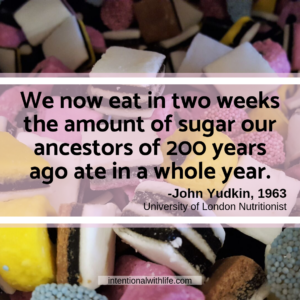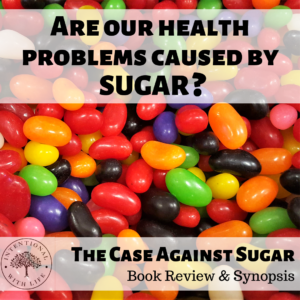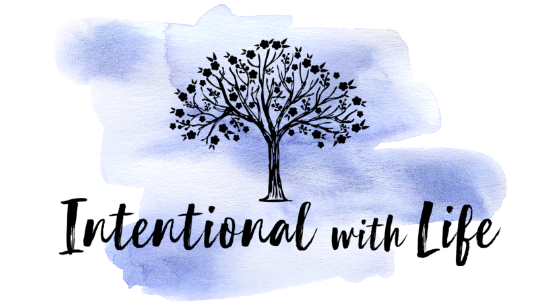When we completed our 30-day no sugar challenge, both my husband and I just generally believed that sugar wasn’t good for us, that it’s addictive, and that it contributes to inflammation in our bodies. Since I knew that I was going to be writing about it on this blog, and because I was genuinely interested in it, I thought I should delve a little bit deeper into how sugar relates to our health.
I found The Case Against Sugar by Gary Taubes (2016) at my local library, both the printed book and an audio recording. I had two overall thoughts on the book. First, the information was compelling. However, in my opinion, the information was not compelling to read. If you enjoy loads of information and history just as it is, you won’t have any problem reading the book. I, however, need a little bit of fun or humor or something to keep me motivated to read on, and this was solely information. I relied on the audiobook to finish and was also motivated to learn what I could for this blog post. I am glad I read the book in it’s entirety and feel that there was loads of good information in the book, I just wish it were presented with a little more “fun” so I could wholeheartedly recommend the book.
The book explains the history of sugar and the sugar industry, as well as when sugar was introduced to various parts of the world. And guess what? There was a trend. There IS a trend. Taubes compiled compelling evidence suggesting that sugar is a direct cause of many of our current health issues. Suggesting may not be the right word, perhaps indicating. Loads of evidence is presented in the book, making the argument that sugar is not just a “factor” in health ailments, but THE cause.
Here’s some of the information that stood out to me.
Fifty years ago, 1 in 8 were considered obese. Now, the statistic is greater than 1 in 3. Worldwide obesity rates have doubled between 1980 to 2014, according to the World Health Organization. Taubes, the author of the book, described the rarity of diabetes historically, then the growth of the diagnosis and what else was going on during that time. Can you guess? The introduction of sugar to the marketplace, along with the growth of the sugar industry. He even uses more “modern” examples of isolated populations that ate certain diets based on their location, then what happened (and how fast it happened) once their population was introduced to “Westernization,” mainly, sugar and refined flour.
“And on those very rare occasions when sugar consumption declined – as it did, for instance, during WWI, because of government rationing and sugar shortages – diabetes mortality invariably declined with it.” (Taubes, 2016, e-book pg. 20).
Taubes is sure to clarify that he’s not just talking about correlations of diseases with sugar, but actual causation, like how we now know that smoking causes lung cancer. While on the smoking topic, did you know that sugar was added to cigarettes to make them more pleasurable to smoke, as well as to make them more addictive?
In the 1960s and 1970s, the concern about eating too much sugar vanished, and was replaced by fat. The emphasis shifted to too much fat in our diets as the cause of our health issues. You remember the “Cheerios lowering your cholesterol” commercials? Ads stating that “low fat” or “fat free” foods were healthier? It was a large part of what I remember learning about nutrition growing up in the 90s. Health professionals and people in general thought that logically, if we are getting too fat, then we must be eating too much fat. Unfortunately, sugar became a lost part of the equation, and it also became a common additive in “health foods.” But, what IF sugar is the MOST important part of the equation? The book gave examples of research studies on low fat or no fat diets whose finding actually did NOT correlate or support an increase in health in the participants. In fact, in one long-term study follow two groups of men, the group of men on the low-fat diet suffered more deaths than the control group, but the researchers refused to believe that a low-fat diet could be harmful. Despite the accumulating evidence to the contrary, the strong drive for reducing fat in our diets continued.

“‘We now eat in two weeks the amount of sugar our ancestors of 200 years ago ate in a whole year,’ as the University of London nutritionist John Yudkin wrote in 1963 of the situation in England.” (pg 188 ebook). Yudkin went on to study the effects of sugar in the diets of laboratory animals and human participants. Results from his studies indicated that sugar consumption would raise triglycerides, cholesterol, and insulin levels. He also found that subjects’ blood cells became “sticky,” which could result in increased risk of blood clots. Though these trials were promising and suggestive, the focus of clinical trials through the 60s and 70s in the United States and Europe remained on fat.
When more research did begin to emerge indicating that sugar may cause health problems, the sugar industry started taking action, making statements and advertisements about how “safe” sugar was. They even began to fund research of their own. As you can see, there were obviously two competing forces. The book goes into more detail on all the efforts made by the sugar industry to defend itself. In my opinion, this, along with our strong desire to treat ourselves, limited what we as a nation believed (and believe) about sugar.
Diabetes, heart disease, cancer, stroke, and Alzheimer’s disease are 5 of the top 10 causes of death in the United States and are known as “diseases of Western Lifestyles.” Cancer researchers suggest that obesity is a cause of cancer. Alzheimer’s researchers refer to Alzheimer’s disease as “type 3 diabetes.” All 5 diseases have been linked to insulin resistance. Without sugar, those 5 diseases are less common, as well as others such as PCOS (Polycystic ovary syndrome), RA (Rheumatoid arthritis), gout, varicose veins, asthma, and IBD (irritable bowel syndrome). These, along with other diagnoses, are discussed in the book with links to sugar consumption. As a health professional, this was particularly interesting to me.
Throughout the book, I found myself thinking, “What if what we learned about fat in our diets is, well, wrong? What if it’s really wrong?” This wasn’t too much of a stretch for me, because I have heard of recent research indicating the health benefits of fats in our diets, contrary to popular belief. And, with added sugar in a LOT of the products we buy at the store, along with the treats we give ourselves, it makes sense to me that the large amounts of sugar we consume as a nation would have consequences to our health. Our diet is a powerful tool that fuels our bodies. I believe it has the power to either harm or heal. This book was definitely an eye-opening book for me, challenging me to assess what I eat and how it may be affecting me. If you are interested in learning more about sugar in our diets and enjoy reading about research, definitely check out this compelling book (or audiobook).
We went 30 days without sugar! Read all about our 30-day no-sugar challenge here.
Citation:
Taubes, G. (2016). The Case Against Sugar. New York: Alfred A. Knopf.
Audiobook and E-reader versions also used.

